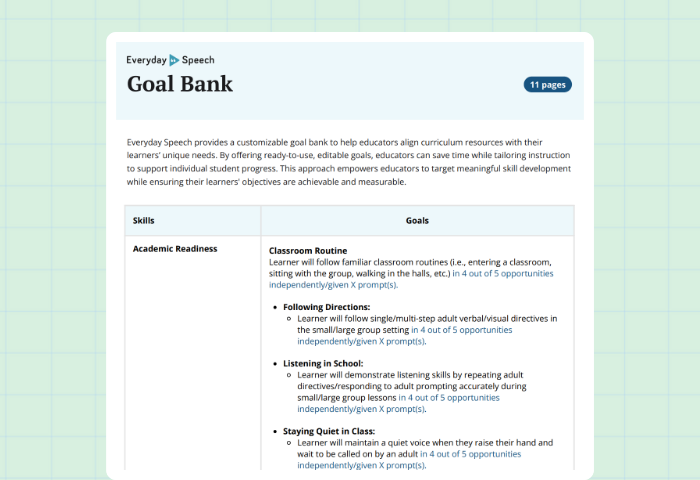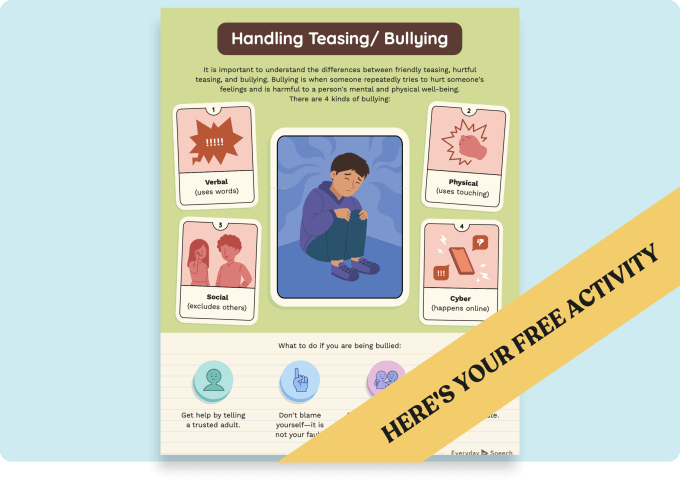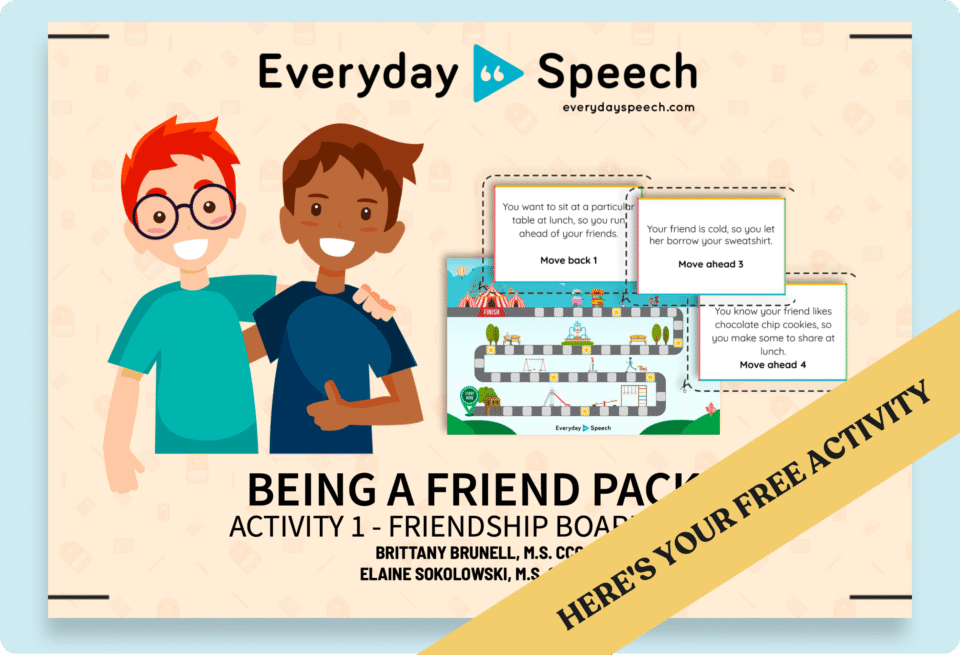Download Conversation Cards: Free High School Activity for Communication Skills
Get free social skills materials
No-prep lessons on self-regulation, emotional recognition, conversation skills, and more.
Sign up hereActivities to Teach Conversation Skills
Help students start, maintain, and deepen peer interactions with no-prep printables and lessons.
Teaching conversation skills is a foundational step toward building student confidence in both academic and social settings.
Related resources:
By high school, many students struggle to initiate conversations—especially outside their familiar peer groups. This can impact group participation, class engagement, and future readiness for college and career environments where clear, direct communication is essential.
The High School Conversation Cards are designed to provide structured, low-pressure opportunities for students to practice initiating and sustaining conversations. The accompanying teaching plan offers a clear instructional flow, making it easy for educators, SLPs, or counselors to lead a focused lesson on this core skill.
This article outlines:
- What’s included in the conversation card activity
- How to structure a complete classroom or small-group lesson using the cards
- Optional follow-up activities for continued skill development
- A free download link to access the materials
Why It’s Important to Teach Conversation Starters in High School
Initiating conversation is a foundational pragmatic language skill. Many students—especially those with social communication challenges—benefit from explicit instruction in how to begin, maintain, and end conversations in different contexts.
Common barriers to initiating conversation include:
- Difficulty identifying appropriate topics for different settings
- Anxiety or uncertainty about how to start a conversation
- Limited practice or feedback on pragmatic language use
By providing concrete examples and repeated opportunities to practice, conversation starter activities help students:
- Build confidence in approaching peers and adults
- Increase flexibility in navigating different social environments
- Strengthen self-advocacy and interpersonal problem-solving skills
These skills support broader communication goals outlined in many IEPs and align with college and career readiness benchmarks.
High School Activity: Conversation Cards
The free printable includes:
- A set of age-appropriate conversation prompts for teens
- A suggested teaching plan for classroom or small-group use
- Ideas for reflection and personalized application
Prompts range from light, everyday questions to more reflective ones, offering opportunities for students to engage at their own comfort level. The resource is flexible and can be used in mainstream classrooms, special education settings, advisory periods, or individual speech sessions.
Activities to Teach Conversation Skills
Help students start, maintain, and deepen peer interactions with no-prep printables and lessons.
Lesson Plan: Conversation Cards
This structured lesson can be completed in approximately 30 minutes and adapted based on student needs and group size.
Step 1: Introduce the skill
Start with a short group discussion:
- Why is it important to be able to start a conversation?
- What makes it easier or harder to start talking to someone new?
- Where do we use these skills in everyday life?
Clarify that initiating a conversation is not always intuitive and that having a script or plan can make it easier. Frame conversation starters as tools students can rely on in unfamiliar or challenging settings.
Step 2: Model and demonstrate
Choose one prompt from the card set. Model a short conversation with a student or co-facilitator:
- Start the conversation using the card
- Demonstrate active listening and appropriate follow-up
- Reflect briefly on what made the conversation work
This step helps demystify the process and sets expectations for students before they practice.
Step 3: Partner practice
Give each student a conversation starter or let them choose one. Instruct them to:
- Pair up with a classmate
- Take turns initiating a conversation using their card
- Practice using open-ended responses and asking follow-up questions
After one round, invite students to switch cards and partners. This repetition helps students generalize the skill across different social partners.
Step 4: Group reflection
Lead a short discussion using questions such as:
- Which prompts felt the easiest to use? Which were more difficult?
- What strategies helped keep the conversation going?
- How can you apply this skill in real life (e.g., class discussions, new student orientation, part-time jobs)?
Encourage students to identify personal strategies that help them feel more comfortable initiating conversations.
Optional Follow-Up Activities
To reinforce and extend the skill, try one or more of these low-prep activities:
- Conversation Starter Brainstorm: Have students generate their own list of conversation starters based on real-life settings (e.g., introducing themselves to a new student, talking to a teacher, meeting someone at a club). Post the list in the classroom for ongoing reference.
- Sticky Note Prompts: Ask students to write their favorite conversation starter on a sticky note and keep it in a visible place, like a locker or notebook cover.
- Role-Play Scenarios: Create simple, age-relevant scenarios that require students to use conversation skills (e.g., first day of a new class, talking to a peer in a group project). Let them role-play in pairs and then reflect on what went well.
Why We Recommend This Resource
The High School Conversation Cards are an accessible tool for building foundational communication skills. We recommend this activity because it:
- Provides structured, low-risk practice in initiating conversations
- Supports core pragmatic language and social development goals
- Can be adapted for classroom, small-group, or individual instruction
- Promotes generalization across academic, social, and community settings
This resource is especially effective when used in repeated practice sessions, as part of a larger communication skills curriculum, or in coordination with IEP goals targeting social interaction.




